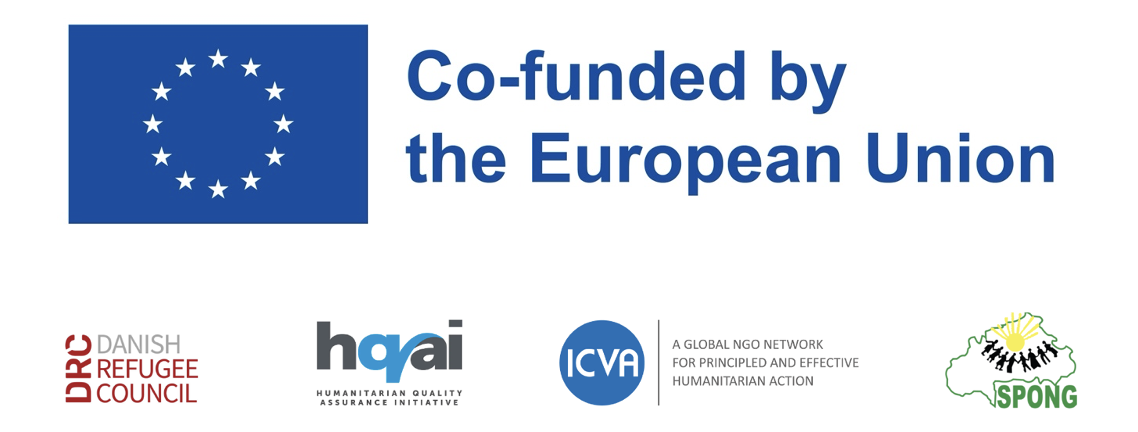New Project to Lower Compliance Burdens for Local and National Associations - Joint Press Release
JOINT PRESS RELEASE
New Project to Lower Compliance Burdens for Local and National Associations

The Danish Refugee Council (DRC), in collaboration with the Humanitarian Quality Assurance Initiative (HQAI), International Council of Voluntary Agencies (ICVA), and the Secrétariat Permanent des Organisations Non Gouvernementales (SPONG), today announces the launch of the project named LOCAL: LOwering CompliAnce burdens for Local and national associations.
The LOCAL project, led by DRC with HQAI, ICVA, and SPONG as subgrantees, co-funded by the European Union, will operate across three countries: Burkina Faso, Mali, and Niger, with a pilot phase commencing in Burkina Faso. Project duration: 2 years.
The project addresses the increasing pressure on Local/National associations (LNAs) from international actors (International Organisations and donor agencies) to comply with complex and sometimes duplicative quality standards. This project proposes an innovative approach to:
- Streamlining due diligence processes: The project will explore and test innovative approaches, such as "due diligence passporting," which leverages existing compliance assessments to reduce duplication and expedite funding access.
- Enhancing LNA capacity: Through tailored training and capacity-building initiatives, the project will equip LNAs with the necessary tools and skills to meet quality and accountability standards such as the Core Humanitarian Standard (CHS).
- Promoting advocacy and engagement: The project will encourage international organisations and donors to recognise the benefits of the Due Diligence Assessment (DDA) passporting approach and support its wider adoption to promote the localisation agenda.
We are proud to lead the LOCAL project, which embodies our commitment to supporting and empowering local and national associations in humanitarian efforts. By collaborating with HQAI, ICVA, and SPONG, we aim to streamline processes and reduce compliance burdens, ultimately facilitating greater access to international funds and advancing the localisation agenda."
Romain Sztark, Head of multi-country operations for DRC
Local and national associations are constantly solicited by international actors and must undergo repetitive, multi-faceted assessments from various potential partners or collaborators within the humanitarian response framework. This is inefficient, counterproductive, and ineffective. This initiative with DRC, ICVA, HQAI will allow beneficiaries to streamline the time spent on assessments and establish minimum standards and procedures to meet the expectations of international actors
Mavalow Christelle KALHOULE, Chair of the Board of Directors of SPONG
The LOCAL project represents a significant step towards enhancing quality, accountability, and equity within the humanitarian sector. By streamlining due diligence processes and providing access to tailored capacity-strengthening services, we aim to empower local and national associations to meet international standards and access vital funding.
Désirée Walter, Executive Director, HQAI
The Danish Refugee Council (DRC) was founded in Denmark in 1956. They are a leading, international humanitarian displacement organisation, supporting refugees and internally displaced persons during displacement, in exile, when settling and integrating in a new place, or upon return. DRC provides protection and life-saving humanitarian assistance. They support displaced persons in becoming self-reliant and included in hosting societies - and they work with communities, civil society, and responsible authorities to promote protection of rights and peaceful coexistence.
The European Union and its Member States are among the world's leading donors of humanitarian aid. Relief assistance is an expression of European solidarity with people in need all around the world. It aims to save lives, prevent and alleviate human suffering, and safeguard the integrity and human dignity of populations affected by disasters and human-induced crises. Through the Directorate General for European Civil Protection and Humanitarian Aid Operations of the European Commission, the European Union helps millions of victims of conflict and disasters every year. With headquarters in Brussels and a global network of field offices, the EU provides assistance to the most vulnerable people on the basis of humanitarian needs.
The Humanitarian Quality Assurance Initiative (HQAI) is an independent, not-for-profit and non-governmental auditor for the humanitarian and development sector. It was founded in 2015 to provide independent third-party quality assurance services to organisations working with vulnerable and at-risk communities.
The International Council of Voluntary Agencies (ICVA) is a global network of non-governmental organisations whose mission is to make humanitarian action more principled and effective by working collectively and independently to influence policy and practice.
The Secrétariat Permanent des Organisations Non Gouvernementales (SPONG), a platform in Burkina Faso, promotes synergy and collaboration among NGOs and development associations.
Category